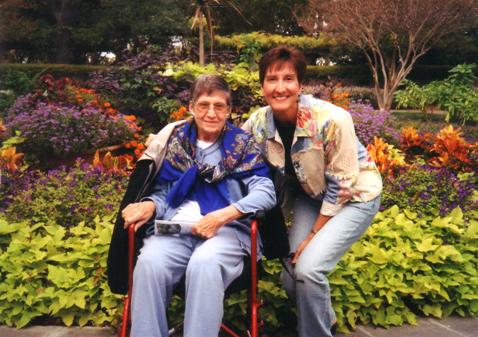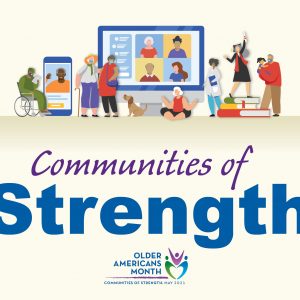Empowering Well-Being in 2024: Resources for People with Dementia on the Pathway to Wellness
Posts about:


Coping with the loss of a family member may be one of the most complex challenges we face. When we lose a spouse, our grief can be particularly intense, and moving on after a long and happy marriage takes time. Loved ones can be catalysts in helping those grieving to find joy and happiness again.
Patricia (Dee) Hutchinson is AGE-u-cate Training Institute's Fulfillment Center Manager. I want to share her story about her father-in-law, Donald, and his journey from loss and grief to finding purpose and meaning after the loss of his wife. Here's their story:

Although my personal story of caregiving goes back decades, the message has not changed. My sweet mother, Jeanette, lived with Parkinson's Disease for many years. Our journey together as care partners included the highs of our incredible mother-daughter relationship growing even closer and the lows of experiencing the emotional roller-coaster of managing a disease that is ever-changing and often mysterious.
At 85, Jeanette's health had declined significantly due to the progression of her PD and complications from a broken hip. In addition, my sister was taking care of our mom in her home following a rehab stay, and the stress of 24/7 caregiving responsibilities took a toll on her physical and emotional health. It was time for a change, and a decision needed to be made relatively quickly.
Visiting one care community after another, I soon became embattled with my own emotions as I toured beautifully decorated buildings led by cheery marketing professionals. All the while, I was an emotional train wreck. What was truly important? I had some real soul searching to do.
A friend suggested I visit a residential care community that her dad had been in, so I arranged for a meeting with the owners, one of who was a registered nurse. The home was not in the most convenient area to my home, but was adequate for my sister and me to visit with a drive for both of us. The neighborhood was eclectic but safe. As I drove to the house, my thoughts were on a single track.
Entering the house, one of the care team members greeted me with a warm welcome and hug. The place was lively and bright, though far from fancy. Sitting areas in the large living room included residents, care partners, and family members.
As I made my way to another sitting room to meet with the owner, I noted the care team busy making lunch and chatting about the new recipe for the day. They stopped to say hello and asked if I'd like to stay. How could I pass up a yummy-looking Mexican dish?
As I sat down to talk, I could feel my emotions bubbling, and sure enough, tears started streaming. My decision of where my precious mama would live out her days played heavy on my heart. What did I want for her, for me, and the rest of my family? After all, we were all in this together.
All of the "things" that I thought were important started racing through my head. Within a short driving distance? Not really. Amenities? Somewhat limited. And this sounds so silly now, but at the time, I thought to myself, "this is just not mom's decorating style."
As I pulled myself from the depths of my crying episode, I felt incredible compassion and understanding embracing me. As I explained mom's health needs and history, it became clear what I was seeking.
Beyond the basics of cleanliness, safety, nursing care, I wanted my mom to be loved when I wasn't there. That sounds like a big ask, right?

AGE-u-cate was honored to welcome Stacy Porter from The Beryl Institute as guest presenter on our October Virtual Road Trip Webinar topic, "Becoming the Best Place to Be."
The Beryl Institute is a global community of healthcare professionals and experience champions committed to transforming the human experience in healthcare. Many of the institute professionals are Certified Patient Experience Professionals (CPXP) who are turning more attention to the Aging Services industry.
Stacy's presentation was based on their recently published white paper entitled, "Becoming the Best Place to Be: Elevating the Experience in Senior Living."The Beryl Institute experience framework consists of eight components, with Culture & Leadership at the top. Stacy shared that the foundation of any successful experience effort is set on the purpose, values and how the organization is lead. Stacy offered steps organizations can take to begin transformation:
Another component of the experience framework is Environment and Hospitality. The elders that participated in interviews indicated that they really look for a culture of home in their communities. Warm and fuzzy words come to mind when most people think of the word home: belonging, love, comfort, safety, relationships. acceptance.
Inclusion is an essential to make any of this work. All stakeholders, most importantly those that live in the community, must be invited to become involved. Stacy concluded with this:
A fundamental shift in thinking and direction is needed. There is no normal to which to return.
AGE-u-cate is grateful for Stacy's time and valuable information shared on our Virtual Road Trip, and we look forward to continued collaboration.

What feels abundant right now is trauma, stress, and burnout. Heading up an Aging Services organization during this time has been no easy task. At AGE-u-cate, we have tried to offer nuggets of support and encouragement to help infuse some hope in what feels like a long nightmare.
With so much out of our control these days, there is something we can control, and that is how we relate to each other. Kindness should always be a part of a leadership philosophy, but when we feel pushed to the edge, kindness might take a backseat.
Kindness can be defined as the quality of being friendly, generous and considerate. Seems like a fairly simple and straightforward way to interact with others. In fact, ABC news reported last year on research that informs us that being kind pays off. Being kind makes us feel better and healthier, and is wired into our survival. Oxford anthropologist Oliver Curry believes that we are kind because under the right circumstances we all benefit from kindness.

Many Aging Services leaders are working tirelessly to maintain and even rebuild a positive culture within their care communities. The question is whether this is possible to do during a lingering pandemic? A McKnight's Long-Term Care News article opined that it is possible, in spite of a pandemic.

I just returned from spending two days in Columbus, OH at the Ohio Healthcare Association Conference with my AGE-u-cate colleague V'Ann Guiffre. I now realize how much I have missed interacting in person with "my people." There is just something about people that work in Aging Services! I won't do justice in explaining what I mean, but you know, there is just something there.